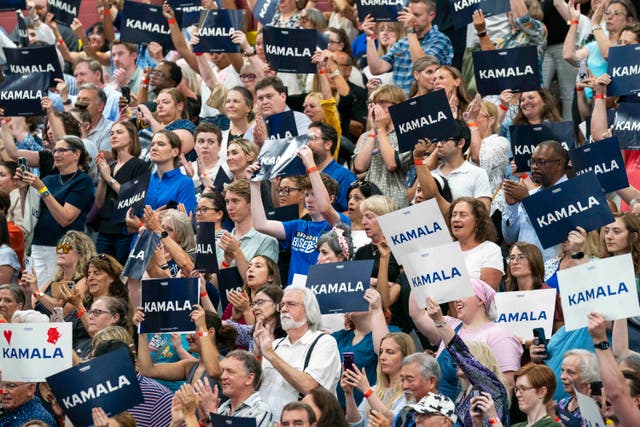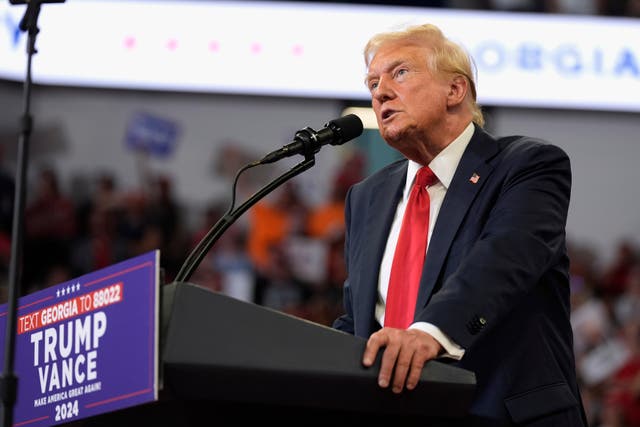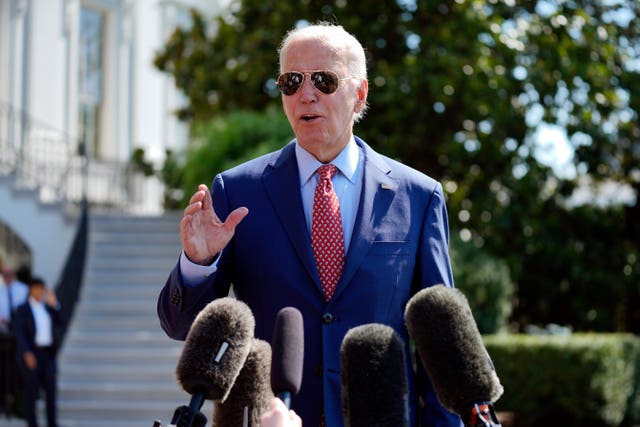Harris faces crunch week as deadline to select running mate looms
The US vice-president will formally become the Democratic nominee on Monday – a formality which is already guaranteed.

US Vice-President Kamala Harris is heading into a crucial week that includes her most critical decision yet – choosing a running mate – while grappling with how to keep the early political momentum of her election campaign alive.
The former prosecutor known for being deliberative effectively has a deadline of Tuesday to select who will be her number two from a list that has been whittled down to four governors, a senator and a cabinet official who was also one of her 2020 foes.
It is a high-pressure decision that usually spans several months, but in this case is compressed into a matter of just weeks.
From there, Ms Harris and her running mate will launch into an aggressive, seven-state battleground tour that begins in Philadelphia on Tuesday and winds through Wisconsin, Michigan, North Carolina, Georgia, Arizona and Nevada. Her early rallies have attracted enthusiastic thousands.
Campaign officials are aware that momentum can be fleeting and are working to capitalise on the energy now, while managing expectations by continuing to emphasise the race with Republican nominee Donald Trump is tight.

Ms Harris faces new tests in the coming days as she works though key decisions – including her vice presidential pick – with the potential to disappoint elements of the coalition.
She has not faced the level of scrutiny that presidential candidates typically face. While she has kept up a busy schedule of public appearances, she has rarely taken questions from the press and has not sat for an in-depth interview.
After four years advocating for Mr Biden’s positions, she will have to stake out positions of her own on the political controversies that divide Democrats.
Ms Harris’s message is coming into clearer focus with each day. Her first television advert last week portrayed her as “fearless” and emphasised what has emerged as a rallying cry for her campaign: “We are not going back.”
She is also repeatedly emphasising the concept of freedom, focusing not just on Mr Trump as a threat to democracy but also the freedom to have an abortion and be safe from gun violence.
Meanwhile, her prosecutorial background is emerging as a central dividing line with Mr Trump. In rallies and ads, she contrasts her record going after hardened criminals and corporate wrongdoers against Mr Trump’s indictments, convictions and civil judgments.

As she and her running mate hit the battleground states this coming week, the vice-president is planning a renewed offensive in Arizona, Nevada, North Carolina and Georgia.
The Biden campaign had long named them among its key targets but had started to abandon hope there in favour of shoring up the so-called “blue wall” states of Michigan, Wisconsin and Pennsylvania.
Campaign manager Julie Chavez Rodriguez is now focusing more on Arizona and Nevada because of what officials say is Harris’s increased competitiveness against Mr Trump in the two states, both of which Mr Biden won four years ago.
“We are the underdogs in this race,” the campaign’s battleground states director, Dan Kanninen, told reporters this past week, repeating a phrase that Ms Harris herself has stressed. “But the groundswell of support around the vice-president is real, and it’s meaningful. Our task now is to translate that enthusiasm into action.”
The Harris campaign says volunteers placed 2.3 million phone calls, knocked on 172,000 doors and sent nearly 2.9 million text messages to voters in battleground states over 12 days. More than 130,000 people logged into an online organising event with Ms Harris and 750,000 people signed up for a campaign event for the first time.
Ms Harris herself is remaining quiet in Washington this weekend, with interviews under way for about half-a-dozen potential running mates who have effectively been auditioning publicly through media interviews.

Ms Harris has revealed little about her deliberations, but she will undoubtedly lean on her own experience of being vetted and eventually chosen as Mr Biden’s running mate four years ago.
Various Democratic constituencies are fervently lobbying in favour of – or in some cases, against – some of the names on the shortlist, based on geographic considerations, past policy stances and voter sentiment.
On Monday, Ms Harris will formally become the Democratic nominee, when online balloting among delegates concludes. There is no suspense there: Democratic National Committee chairman Jaime Harrison said in a virtual meeting with supporters on Friday that Ms Harris had already secured enough delegates to become the nominee.
Another big moment yet to come will be a debate between Ms Harris and Mr Trump – or not.
The two sparred over the weekend about when and where to debate.
Mr Trump pulled out of a September 10 debate on ABC in favour of a September 4 debate on Fox News. Ms Harris’s campaign says it is sticking with the original date, and Mr Trump posted on social media: “I’ll see her on September 4th or, I won’t see her at all.”





